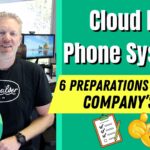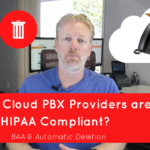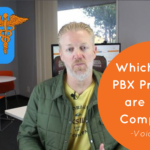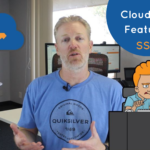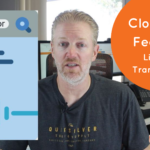Where does pricing and cost fit inside the ultimate cloud PBX shopping checklist for large companies?
In the video below, Mike explains the different pricing structures available with various cloud PBX service providers, and what type of structure you should look for, as a large company.
Want Mike’s recommendations on the best cloud PBX service providers to quote for your large company? Click the button below to ask him today.
About Mike

Mike Smith has been helping companies select the best telecom, WAN, security, and cloud services since 1999. He founded AeroCom in 2003, and has been the recipient of numerous business telecommunications industry awards, including being recognized as one of the top 40 business people in tech-heavy Orange County, CA. Follow Mike on YouTube, LinkedIn, Reddit and SpiceWorks.
Transcript
Your company is large, like over 100 employees/phone system users, and you’re shopping for a new phone system. I know large is somewhat relative. I mean, large, a lot of times, is really over 5,000 cloud PBX users, but at least if you have over 100 phone system users and you’re shopping for a new phone system for your company, your company’s needs are definitely different than a company with only five employees.
So what are the things that you should be asking? What are the questions you should be asking when you’re shopping for a cloud PBX solution? And so I wanted to make a video series on this topic. And today, I wanted to talk about pricing. What should you know about pricing if you are working for a large company and you’re shopping for a new cloud PBX solution.
Ask me for a shortcut
But before I get too deep into the topic, really quick plug. If you’d like my recommendations on the best cloud PBX service providers for your large organization, don’t hesitate. Just reach out. Contact me on phone (714.593.0011), or by email. I’ll ask you a few questions, and I’ll quickly pair you up with the right service providers to quote and introduce you to the right people at those organizations. More information on that at the end of the video. Also, don’t forget to please Like the video, if you think it’s useful, and subscribe to the channel, so you don’t miss any other future videos. It also helps us get rid of the advertisements on the videos.
All right. So if your company is large and you’re shopping for a new cloud PBX solution, one of the things that you definitely need to understand is that pricing is different with every service provider, or I should say almost every service provider. So not all cloud PBX solutions have the same pricing structure, and some pricing structures are going to favor certain types of companies over others. So knowing that in advance, you should have certain things that you want to ask yourself about your company’s size and your usage patterns and things like that.
Unlimited Usage
So, the first type of pricing that you’ll see out there is unlimited pricing. So what that is is that for every single user, your company will receive unlimited calling and you’re going to pay a flat rate for every single user. So every single user might be $12 to $15 to $20 per month, depending on the feature package that you choose. And with that per person charge, every single user has unlimited calling available, and you also have a call path available for every single user. So if every single user in the company can be on the phone at the same time, everybody will have an outside line, and every person in the company has unlimited calling.
So if you are hearing what I’m saying, if you’re a large company over 100 employees or more, this is probably not going to be the best pricing plan for your organization, especially when you start getting into the 1,000 employees or more. And the reason why is because every single user is going to have a call path available to them and have unlimited calling.
Well, if you have 1,000 people in your company, do you really need 1,000 people to have the ability to be on the phone simultaneously? Probably not, unless you’re running 1,000-person call center. That would be different. But if it’s just a normal company, that’s going to be overkill. So you’re paying for way too many call paths, and you also don’t need that much usage. There’s no way every single user in your company is on the phone all the time. So they don’t need unlimited calling minutes for every single person in the company.
So who does it fit?
But that’s a great pricing plan for small companies. So if you have five employees, hey, there’s a good chance all five people are going to be on the phone at the same time. And there’s a good chance those five employees are pretty active on the phone because you only have five. And so when people call in, people are answering the phone, people are making outbound calls. That’s pretty common. But for 5,000 or 1000, or even 150, that’s probably not the most… or probably the most efficient pricing plan for your organization. So just know that upfront and think about how your company uses the phone and what type of pricing plans that you need.
Bundled Minutes
Another type of pricing you’re going to see out there is that some service providers only give you a certain amount of calling minutes per user. So they’re going to charge you less per user, but give you a limited amount of calling minutes per user and then some of them allow you to pool those minutes among all of your users. So say they only give you like 50 minutes per month of outbound calling, outbound domestic calling, let’s say, and per user, per month. So that doesn’t sound like a whole lot for some of your power users, but if they let you pool the minutes among all of your users, if you have 1,000 employees and you start pooling those minutes, that helps you. It adds up and probably compensates for your high usage users because you probably have a lot of users that aren’t going to use that amount of minutes. So just another thing to think about. And there’s also some service providers that offer that type of user license for common area phones.
So maybe, you have an unlimited plan for your users, but for common area phones that don’t get used a whole lot, they’ll offer things like 50 minutes per month, per common area phone like a conference room or a kitchen phone or a lobby phone or a warehouse phone, things like that. They’ll offer plans like that where it’s not as many features and less minutes per month and you can pool them. So just another plan to think about as a possibility.
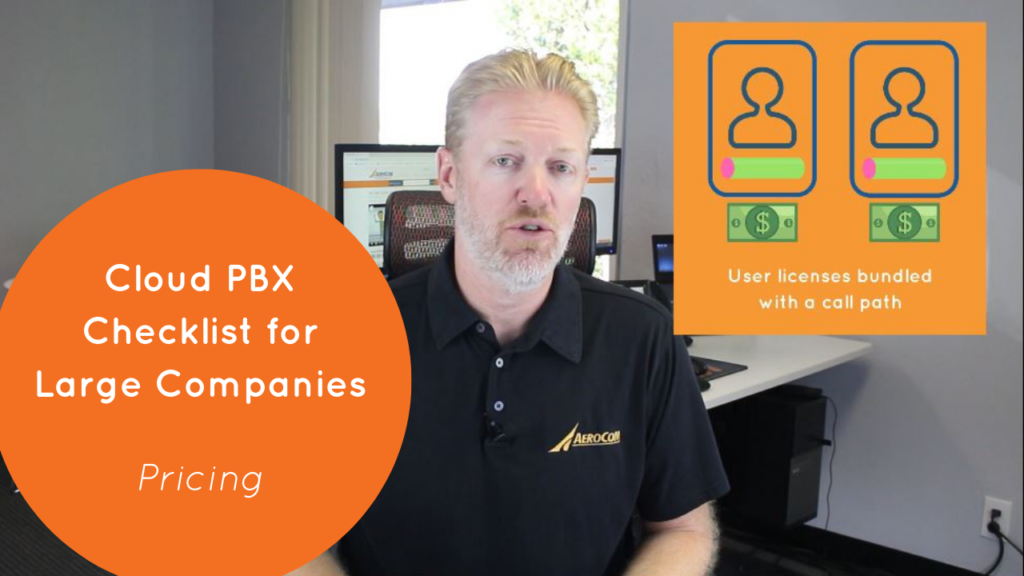
Unbundled Call Path Pricing
Another type of pricing structure that some service providers offer is called call path pricing. So what this is is that they discount their per user charge or their per user license, their monthly charge for those. So for instance, they may only charge $5 per month per user or $10 per month per user, instead of 10 to 15 to 20. And then in addition to that, they charge $20 per month, or something like that, for every simultaneous call path that your company needs.
So what I mean by that is, say, you have 1,000 people in your company, but maybe only 100 people are ever on the phone simultaneously within the whole organization. Well, in a pricing plan like I just mentioned, you would pay, say, for instance, $5 per month per user, so that’d be $5,000 per month just for the users, but then you would pay $20 per month per simultaneous call path. So you would pay maybe $2,000 per month for your call paths, and you would pay $5,000 per month for your users, which would be a much better calling plan structure or pricing structure than a company that, say, that charges $15 per month per user. So $15 per month per user times 1,000 users would be $15,000 per month. So you compare that to pricing on a call path pricing model where, “Hey, we only have 100 people on the phone simultaneously,” and you’re going to get a lot better pricing than if you just get charged per user. So another creative way that some service providers are out there pricing things to fit larger companies.
Metered Pricing
And still another way that some service providers structure their pricing is metered pricing. So this goes back to the old days when, hey, I’ve been in the industry over 20 years, so I was around where everything was per minute, right, and we were selling phone lines and PRIs and things like that, and it was a per minute charge. Well, some cloud PBX service providers are still doing that, and they’re charging a metered rate. A lot of companies don’t prefer doing this because they don’t want to get back to the looking at the call detail and the counting the minutes per month and their bills change every single month, so it’s kind of a pain to audit your phone bills all the time and kind of keep an eye on them. It’s much easier if you have a flat rate and you kind of know what your phone bill’s going to be every single month, and that’s what you pay.
But some companies still prefer a metered plan, and some cloud PBX service providers still offer metered pricing. So they charge you per minute per phone call. What you have to watch out for is sometimes, it’s not just for outgoing minutes. It’s also for incoming minutes, even if people are calling your company’s local phone numbers. So toll free 800 numbers, yeah, incoming calls are always charged for those, but some companies also just charge for incoming minutes on local telephone numbers, as well as outgoing minutes. So if you want a metered plan, that’s great, but just make sure that you are aware if they’re charging you for not just outbound minutes, but also incoming minutes because those charges can add up. So just something to watch out for there.
Mix ‘n Match
The last thing I want to talk about when it comes to cloud PBX pricing for large organizations is the per license cost per user for different feature packages. Some cloud PBX service providers are a one size fits all, meaning that if you pick one feature package for one user, you have to pick the same feature package for your entire organization, where other cloud PBX service providers allow you to mix and match feature packages. So you can still have the same account, but you could have your users that need all types of different features and need to be able to pull reports and train employees by listening into their calls and things like that. They can have an advanced feature package while other employees who don’t really use the phone a whole lot can have a lesser expensive, really slimmed down feature package that doesn’t have a lot of features on it, and you could pay a lot less for those users as opposed to the high end users who need all the feature packages.
Break it down by department
So the question you need to ask internally is do we have a lot of various types of users within our organization, or is our organization pretty static when it comes to the features that organization needs, or is it really varied depending on the department? So another thing to think about.
So those are some things that you need to think about when it comes to cloud PBX pricing and some questions that you probably need to ask internally that’ll help you really understand, “Hey, what type of provider are we looking for? What type of pricing structure would fit us ideally.” And if you know those things up front, it’ll really help you quote the right service providers right away.
Anything else I should know?
Now, there’s a bunch of other things that you need to think about too, and that’s where I come in. So if you’d like my recommendations on the best cloud PBX service providers for your large organization to quote, you could watch all my videos in this series and things like that, and that’s great and everything, but just make it easy and reach out and contact me, via email or by phone (714.593.0011).
I’ve been doing this for 19 years in terms of owning our company, and so I know all the major service providers in the marketplace and based on some questions I’ll ask your organization, I can quickly tell you the top three to five service providers that your organization should be quoting, and I’ll help you avoid the ones that have a really bad reputation, so you don’t end up with the wrong ones. I’ll also oversee the quoting process, introduce you to the right people at those organizations, and make sure that you get the lowest pricing available with every service provider.
The nice thing is is those service providers pay me my broker fee. So you don’t have to pay me anything for my service, so there’s absolutely no excuse not to at least reach out and ask me for my opinion on this stuff.


